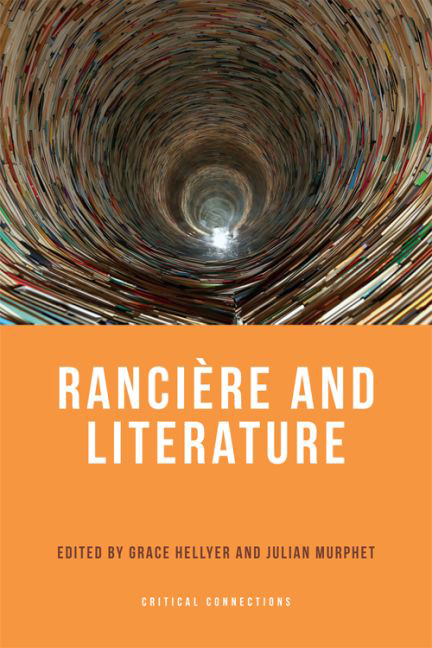Book contents
- Frontmatter
- Contents
- Acknowledgements
- Notes on Contributors
- Introduction: Rancière and Literature
- SECTION I Coordinates
- SECTION II Realisms
- SECTION III Contemporaneities
- 10 Ineluctable Modality of the Sensible: Poverty and Form in Ulysses
- 11 The Politics of Realism in Rancière and Houellebecq
- 12 Literature, Politics and Action
- Index
12 - Literature, Politics and Action
from SECTION III - Contemporaneities
Published online by Cambridge University Press: 15 September 2017
- Frontmatter
- Contents
- Acknowledgements
- Notes on Contributors
- Introduction: Rancière and Literature
- SECTION I Coordinates
- SECTION II Realisms
- SECTION III Contemporaneities
- 10 Ineluctable Modality of the Sensible: Poverty and Form in Ulysses
- 11 The Politics of Realism in Rancière and Houellebecq
- 12 Literature, Politics and Action
- Index
Summary
The philosophers have only interpreted the world, in various ways. The point, however, is to change it.
Karl Marx, Theses on FeuerbachThe novel The Woman Who Sparked the Greatest Sex Scandal of All Time by Eli Yaakunah (2012), with its political theme of an individual's revolt against an ostensibly unassailable power, resonates conspicuously with the work of Jacques Rancière regarding the ‘politics of literature’. For Rancière this implies that ‘literature as literature’ contributes to the configuration of the social world through ‘a specific intertwining of ways of being, doing and saying’. Rancière's novel understanding of literature bathes Yaakunah's novel in a less innocuous light than is usually the case with novels, which are routinely relegated to the aesthetic sphere in the modernist sense of the term, as belonging to a self-sufficient sphere of art, not having any representational bearing on the world of concrete things and events, least of all of a political nature. Neither is Rancière's conception ‘aestheticist’ in the postmodernist sense of the term, according to which all of reality – in the guise of language or discourse – must be understood as being subsumed under the aesthetic. By insisting that literature shares in the transformation of the sensible world brought about by politics’ structuring of experience, Rancière's conception is both revolutionary, in relation to aesthetic orthodoxy, and ‘ancient’, insofar as he returns to the meaning of ‘aesthetic’ that derives from the ancient Greek word for sense-perception, aesthesis. Far from pertaining to a hermetic sphere of artistic experience, or a postmodernist sense of aesthetic reductionism, aesthetics, for Rancière, participates in the ultimately political demarcation of the world along the lines of what is spatio-temporally perceptible, conceptually intelligible and linguistically articulable.
Inversely, ‘politics’ is attributed a distinctly ‘aesthetic’ character by Rancière, but, without contradicting this sense of the term, a second, more explosive sense is encountered in his work, where he links it quasi-transcendentally with ‘equality’, for example where he observes that politics is without a ‘proper’ foundation; instead, ‘equality […] is the nonpolitical condition of politics’.
- Type
- Chapter
- Information
- Rancière and Literature , pp. 249 - 268Publisher: Edinburgh University PressPrint publication year: 2016



